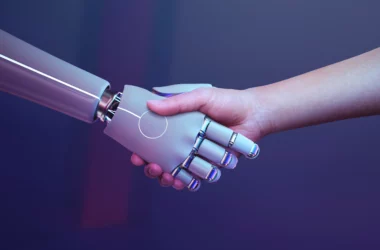However, as AI technology continues to evolve at an exponential pace, the future promises both remarkable opportunities and significant challenges. This essay will explore the future of AI technology, touching on its potential, the challenges it poses, and the ethical considerations that must be addressed.
The Promise of AI: A New Era of Innovation
The future of AI holds incredible potential to revolutionize industries, solve complex global problems, and enhance everyday life. One of the most significant areas where AI will likely have a transformative effect is healthcare. AI-powered diagnostic tools are already helping doctors detect diseases with greater accuracy, and as these technologies improve, AI could assist in identifying patterns across vast datasets to predict and prevent health issues before they arise. For example, AI could help detect early-stage cancers or provide personalized treatment plans based on an individual’s genetic makeup.
In the realm of education, AI could lead to highly personalized learning experiences, allowing students to learn at their own pace and tailoring instruction to their unique needs. Virtual tutors powered by AI could help address educational inequalities by providing quality learning resources to underprivileged communities.
Moreover, AI is expected to make significant strides in autonomous systems, such as self-driving vehicles and drones, which could revolutionize industries like transportation, logistics, and even agriculture. Self-driving cars could reduce traffic accidents, optimize transportation networks, and lower carbon emissions. In agriculture, AI could assist in precision farming, optimizing crop yields while minimizing environmental impact.
AI is also poised to accelerate advancements in scientific research. Machine learning algorithms can analyze vast datasets far more quickly and accurately than humans, potentially speeding up discoveries in fields such as drug development, materials science, and climate change.
Challenges: The Road Ahead
While the potential of AI is vast, the technology comes with a set of challenges that must be carefully navigated. One of the most pressing concerns is the impact of AI on jobs and the workforce. Automation powered by AI could displace millions of workers, particularly in sectors like manufacturing, transportation, and customer service. According to some estimates, automation could lead to the loss of up to 30% of jobs globally by 2030. While new jobs may be created in AI development, data science, and other high-tech fields, many workers may struggle to transition into these roles without proper retraining and reskilling opportunities.
Moreover, as AI systems become more complex and autonomous, the risk of errors or unintended consequences increases. For instance, an autonomous vehicle might misinterpret a traffic situation and cause an accident, or an AI algorithm used in the criminal justice system could perpetuate bias if not carefully monitored. Ensuring that AI systems are reliable, transparent, and accountable will be a critical challenge for the future.
Another concern is the growing reliance on AI for decision-making, especially in high-stakes areas like healthcare, law enforcement, and finance. Algorithms may be highly efficient, but they are also prone to biases based on the data they are trained on. If the data used to train an AI system is flawed or incomplete, the outcomes could be biased, discriminatory, or unfair. For example, facial recognition software has been criticized for its higher error rates when identifying people of color. Ensuring that AI systems are trained on diverse, representative datasets and that they undergo rigorous testing to detect biases will be crucial.
As AI becomes more integrated into society, ethical questions will become increasingly important. One of the central debates revolves around the issue of AI autonomy. If AI systems are able to make decisions independently, who is responsible if those decisions result in harm? For example, if an autonomous vehicle causes an accident, should the manufacturer of the vehicle be held accountable, or should the AI system itself be held liable? These are questions that lawmakers, technologists, and ethicists will need to grapple with in the coming years.
Moreover, the rise of AI-powered surveillance systems has raised concerns about privacy and civil liberties. Governments and private corporations are increasingly using AI to monitor citizens, track online behavior, and predict criminal activity. While these technologies may be useful in enhancing security, they also pose significant risks to individual freedoms and privacy. Striking the right balance between security and privacy will be a key challenge for societies that seek to adopt AI responsibly.
Another ethical dilemma is the potential use of AI in warfare. AI-powered drones and autonomous weapons could change the nature of conflict, raising concerns about the risks of accidental escalation or the targeting of civilians. The prospect of AI being used in military contexts underscores the need for international regulations and ethical frameworks to govern the development and deployment of AI in such scenarios.
Finally, there is the question of the long-term consequences of creating superintelligent AI—systems that could surpass human intelligence. While this remains speculative, the possibility of AI surpassing human cognitive abilities raises profound questions about control and power. How do we ensure that AI operates in ways that are beneficial to humanity? How do we prevent the concentration of power in the hands of a few organizations or governments who control these technologies? These existential risks must be considered as we advance in AI research.
Building a Responsible Future
The future of AI technology is filled with both immense promise and significant challenges. The advancements AI will bring to healthcare, education, transportation, and other sectors offer the potential to improve lives globally. However, these opportunities must be approached with caution and responsibility. As AI systems grow more powerful, it is essential to address the challenges of job displacement, bias, accountability, and the potential misuse of AI. Equally important is the need to develop ethical frameworks that govern AI development and usage, ensuring that AI is aligned with human values and societal well-being.
In navigating this complex future, collaboration among technologists, ethicists, policymakers, and the public will be essential. With careful consideration and foresight, AI can become a tool that amplifies human potential and leads to a more equitable and prosperous future for all.








